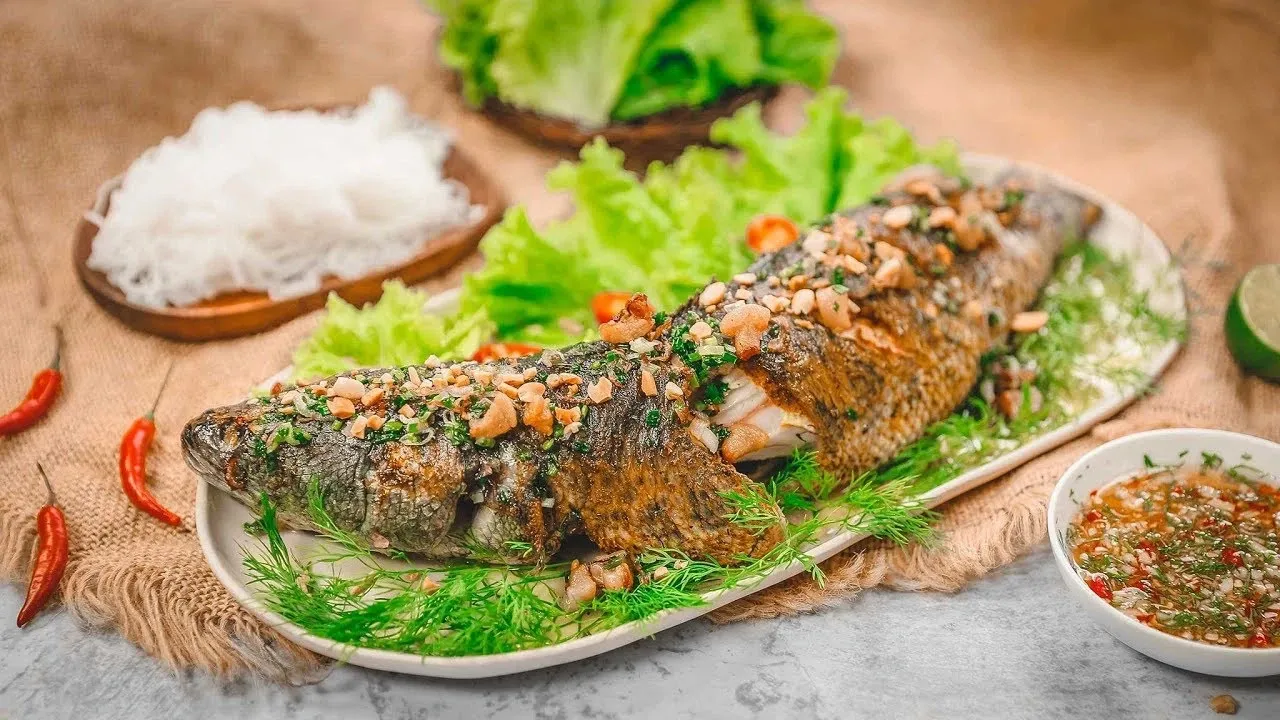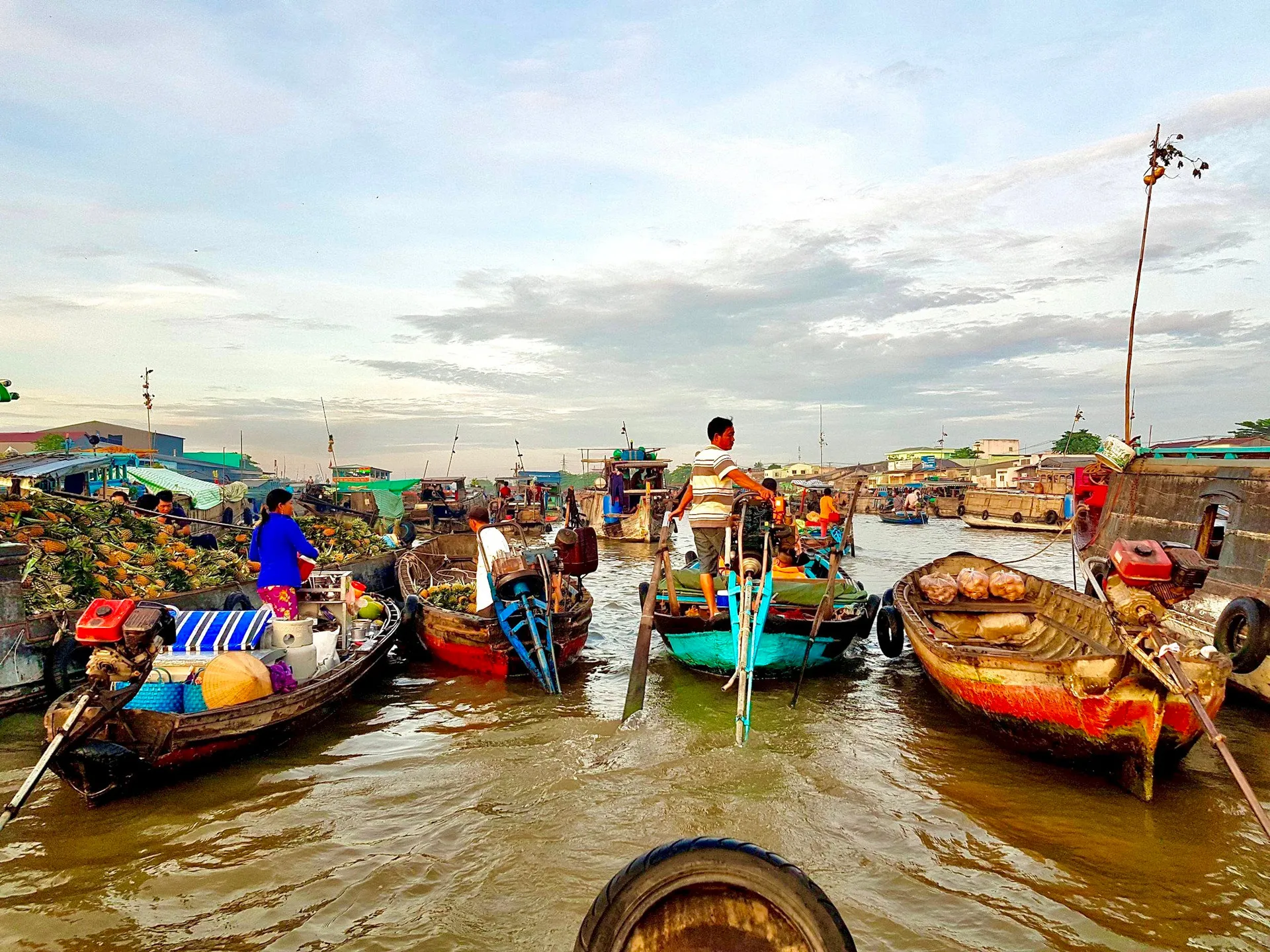The Mekong Delta, the serene land of nine dragons, has long been an attractive destination for tourists thanks to its lush natural beauty and unique cultural identity. This region captivates visitors not only with its vast rice paddies and verdant orchards but also with its diverse and rich culture, evident in its attire, cuisine, festivals, and traditional arts. A cultural tour of the Mekong Delta unveils a fascinating journey, offering profound experiences of the land and its people.
Ao Ba Ba – Cultural Icon of the Mekong Delta
When Mekong Delta culture is mentioned, the image of the graceful Ao Ba Ba, paired with black silk trousers and a checkered scarf (khan ran), immediately comes to mind. The Ao Ba Ba is not merely traditional clothing but a cultural symbol, representing the simplicity, sincerity, and gentleness of the people in this riverine region.
Originating from the Khmer people’s attire, the Ao Ba Ba was adapted to suit the lifestyle and climate of Southern Vietnam. With its simple, unpretentious design, the Ao Ba Ba offers comfort and convenience to the wearer, especially in the watery environment and humid climate. Materials for Ao Ba Ba are often kate fabric, silk, or satin, in a variety of colors, from bright hues like white, pink, and blue to muted tones like brown and black.
Today, the Ao Ba Ba is not only worn in daily life but also appears in festivals and cultural events, becoming a distinctive artistic performance costume. Visitors to the Mekong Delta can easily spot the Ao Ba Ba in floating markets, traditional craft villages, or eco-tourism areas. Experiencing wearing an Ao Ba Ba, strolling along country roads, and immersing yourself in the Mekong Delta’s cultural space will be an unforgettable memory in your cultural travel journey.
Mekong Delta Cuisine – A Symphony of Unique Flavors
Mekong Delta cuisine is an indispensable part of any cultural tour, a convergence of Vietnamese culinary essence and neighboring cultural influences. Blessed with waterways, the Mekong Delta is famous for dishes prepared from fresh fish, shrimp, crab, and snails. Furthermore, the diversity of vegetables, fruits, and tropical produce contributes to the richness and distinctiveness of the local cuisine.

Some signature dishes that visitors should not miss when exploring Mekong Delta culture include:
- Grilled Snakehead Fish (Cá lóc nướng trui): A rustic, quintessentially rural dish, the snakehead fish is grilled directly in rice straw, retaining its natural sweetness and distinctive aroma.
- Fermented Fish Hot Pot (Lẩu mắm): A rich and flavorful hot pot featuring fermented fish broth (mam ca linh), combined with various seafood, meats, and fresh vegetables, creating an unforgettable culinary experience.
- Herring Salad (Gỏi cá trích): A fresh, spicy, sour, and savory salad made with raw herring, mixed with herbs, onions, peanuts, and sweet and sour fish sauce.
- Vietnamese Pancake (Bánh xèo): Crispy pancakes filled with shrimp, pork, and bean sprouts, served with fresh herbs and a special dipping sauce.
- Folk Cakes (Các loại bánh dân gian): Including Banh bo (honeycomb cake), Banh da lon (steamed layer cake), Banh chuoi (banana cake), Banh la mit (jackfruit leaf cake)… bringing the sweet and fragrant flavors of the countryside.
To fully experience Mekong Delta culinary culture, visitors can explore traditional markets, floating markets, enjoy street food, or participate in cooking classes to learn about preparing local specialties.
Multi-Ethnic Cultural Intersection – Unique Beauty of the Mekong Delta
Mekong Delta culture is a unique blend of various cultures, primarily Kinh (Vietnamese), Khmer, Hoa (Chinese), and Cham. This intersection has created a colorful cultural tapestry, clearly reflected in architecture, religion, festivals, and customs.
Khmer pagodas with their unique architecture and intricate patterns are distinctive cultural highlights of the Mekong Delta. Doi Pagoda (Soc Trang), Vam Ray Pagoda (Tra Vinh), and Ang Pagoda (Tra Vinh) are typical architectural works, attracting numerous visitors to explore Khmer culture.

Besides, Chinese temples and communal houses (miếu, đình) also contribute to the diversity in religious architecture. Ong Pagoda (Can Tho) and Ba Chua Xu Temple (Chau Doc) are important spiritual sites, attracting locals and tourists to pray for peace and fortune.
Festivals in the Mekong Delta are also a clear expression of cultural intersection. Ok Om Bok festival of the Khmer, Nghinh Ong festival of the Hoa, Via Ba Chua Xu festival of the Kinh… each carries unique characteristics, reflecting the beliefs and customs of each ethnic group, while creating a joyful and lively atmosphere for the Mekong Delta region.
Floating Markets – The Soul of Mekong Delta River Culture
Floating markets are a unique and distinctive cultural feature of the Mekong Delta, a symbol of riverine life and commerce on water. Visiting a floating market, tourists will immerse themselves in the bustling, vibrant atmosphere of a market on the river, admiring hundreds of boats and canoes filled with goods, from agricultural products and fruits to food, drinks, and daily necessities.
Floating markets are not only places for buying and selling goods but also for cultural exchange, meeting friends, enjoying food, and experiencing the riverine life of the Mekong Delta people. The sounds of boat engines, hawkers’ calls, and laughter blend together, creating a distinctive symphony of the floating market.
Some famous floating markets that visitors should visit when exploring Mekong Delta culture:
- Cai Rang Floating Market (Can Tho): The largest and most famous floating market in the Mekong Delta, operating from early morning to noon.
- Cai Be Floating Market (Tien Giang): A long-standing floating market, famous for its specialty fruits.
- Nga Nam Floating Market (Soc Trang): A floating market at the intersection of five rivers, bustling in the early morning.
- Tra On Floating Market (Vinh Long): A floating market imbued with local culture, less touristy.

Experiencing a boat trip on a floating market, enjoying breakfast on the river, shopping for local specialties, and immersing yourself in the vibrant atmosphere of the floating market will be an unforgettable cultural travel experience.
Don Ca Tai Tu – Intangible Cultural Heritage
Don Ca Tai Tu is a distinctive folk art form of the Mekong Delta, recognized by UNESCO as an Intangible Cultural Heritage of Humanity. Don Ca Tai Tu is a delicate combination of music, singing, and performance, expressing the soul, emotions, and life of the Mekong Delta people.
The art of Don Ca Tai Tu uses traditional musical instruments such as the kìm (moon lute), cò (Vietnamese violin), tranh (zither), bầu (monochord zither), and sáo (bamboo flute), with sweet and deep melodies. Performers of Don Ca Tai Tu are not only artists but also farmers, fishermen, those who love art and want to convey traditional cultural values.
Visitors can enjoy Don Ca Tai Tu at garden houses, eco-tourism areas, art performances, or cultural festivals in the Mekong Delta. Listening to the melodious tunes of Don Ca Tai Tu, feeling the sweet and deep songs will help visitors further understand the soul and culture of the Mekong Delta people.
Conclusion
A cultural tour of the Mekong Delta is a journey of colorful discoveries and experiences. From the graceful Ao Ba Ba attire, distinctive cuisine, multi-ethnic cultural intersection, unique floating markets to the art of Don Ca Tai Tu, all blend together to create a unique and captivating Mekong Delta cultural identity. Come to the Mekong Delta to feel and discover the distinctive cultural values, the simple and sincere beauty of the land and its people. Surely, this cultural travel journey will leave you with unforgettable memories and deep impressions of the gentle Mekong Delta region.